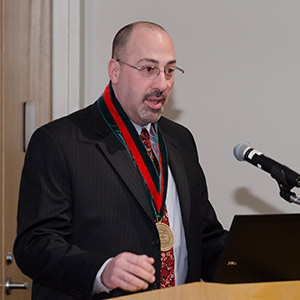
James M. DuBois, DSc, PhD, has been named the Steven J. Bander Professor of Medical Ethics and Professionalism at Washington University School of Medicine in St. Louis.
DuBois, a professor of medicine, was installed by Washington University Chancellor Mark S. Wrighton and Larry J. Shapiro, MD, executive vice chancellor for medical affairs and dean of the School of Medicine.
“The generosity of the Banders will enable James DuBois to remain at the forefront of medical ethics and continue his important research and teaching,” Wrighton said. “We are extremely grateful for this gift, which will benefit clinicians and researchers for generations to come.”
Added Shapiro: “James DuBois is an innovator in his field who is working to understand individual and environmental factors that contribute to professionalism and professional lapses. He is an excellent choice for this honor.”
In his research, DuBois develops measures to assess outcomes of training programs in ethics and professionalism in medicine and conducts social science studies of patient and research participant attitudes. His lab translates these findings into evidence-based training programs and policy recommendations.
DuBois started the first U.S. medical school training program focused on empirical research into bioethical topics. He founded and edits an award-winning bioethics journal with Johns Hopkins University Press that publishes stories of patients, family members and health-care providers.
With National Institutes of Health (NIH) funding, he also established and now directs the Professionalism and Integrity in Research Program, a workshop for researchers who have had compliance or integrity lapses in their labs. The program has been used by top research institutions in the United States, and it received the Health Improvement Institute’s 2013 Award for Innovation in Human Research Protections.
DuBois’ research and training programs have been funded by the NIH and the U.S. Office of Research Integrity since 2000. Several of his publications have won awards, including the 2014 Professionalism Article Prize from the American Board of Internal Medicine and the 2010 Best Article Prize of the Society of Research Administration.
Before coming to Washington University, DuBois had a 17-year career in medical ethics at Saint Louis University. There, he served as director of the PhD program in health-care ethics, director of the Bander Center for Medical Business Ethics and became the inaugural Hubert Maeder Professor of Health Care Ethics.
In 2007, he became director of the Center for Clinical Research Ethics within the Institute of Clinical and Translational Sciences at Washington University. In 2014, he joined the full-time faculty as a professor of medicine and also established the Professional and Social Issues Laboratory in the Department of Medicine.
He has served on committees of the Institute of Medicine, the United Network for Organ Sharing and the American Psychological Association. DuBois is a member of the NIH standing study section on Social and Ethical Issues in Research and serves on a data and safety monitoring board of the National Institute of Drug Abuse.
“It’s a great honor to be named the Steven J. Bander Professor of Medical Ethics and Professionalism,” DuBois said. “I have known Dr. Bander for almost 10 years. He is a generous person who beautifully balances a realism about the challenges physicians face and an idealism about what medical research and practice can be.”
DuBois earned a PhD in philosophy from the International Academy of Philosophy in Liechtenstein and his DSc in experimental psychology from the University of Vienna in Austria.
About Steven Bander
Steven J. Bander, MD, a native of St. Louis, has spent more than 35 years in the practice of critical care medicine and nephrology. He graduated from Saint Louis University with a bachelor’s degree in biology and earned his medical degree from the University of Missouri-Columbia. After completing a residency at University of Iowa Hospitals and Clinics, Bander completed a fellowship in nephrology at Washington University. He continues to practice medicine as an interventional nephrologist and medical director of the Vascular Access Center in Frontenac, a service of St. Luke’s Hospital.
Bander has vast experience in the development, operations and senior executive leadership of local, national and international outpatient health-care facilities. Soon after receiving a legal settlement from a qui tam action in 2005, Bander established the BF Charitable Foundation to promote ethical business practices in medicine. The foundation shortly thereafter endowed the Bander Center for Medical Business Ethics at Saint Louis University to promote the training of and research opportunities for physicians at all levels.
The center has endowed lecture series on topics in medical business ethics at Washington University and Saint Louis University; established a program for medical students that involves presentations on medical reimbursements, improper billing, conflicts of interest, and reflections on integrity in medicine; and provided seed-grant money for research examining environmental factors that foster wrongdoing in medical research and practice.
In 2008, the BF Charitable Foundation gave funding to the Institute of Clinical and Translation Sciences (ICTS) at Washington University to establish a sister program called the Bander Business Ethics in Medical Research Funding Program. Its goal was to promote innovative research that examines ethical issues arising from the business or financial dimensions of medical research. This endowment recently was expanded to create the Steven J. Bander Professorship in Medical Ethics and Professionalism this year.
In 2010, Bander received the FBI Director’s Community Leadership Award for the development of medical ethics programs.